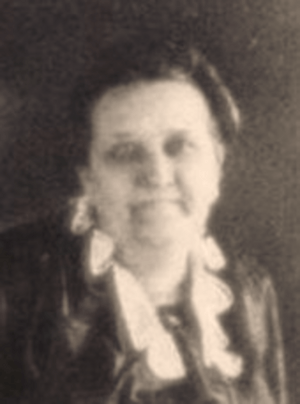Jane Hicks Gentry facts for kids
Quick facts for kids
Jane Hicks Gentry
|
|
|---|---|
 |
|
| Born |
Jane Hicks
December 18, 1863 |
| Died | May 25, 1925 (aged 61) |
| Resting place | Odd Fellows Cemetery Hot Springs, North Carolina |
| Known for | Appalachian folklore and songs |
| Spouse(s) | Jasper Newton Gentry |
| Children | 9 |
| Parent(s) | Ransom Merritt Hicks Emily Harmon |
Jane Hicks Gentry (born December 18, 1863 – died May 25, 1925) was a famous storyteller and singer from the Appalachian Mountains. She was born in Watauga County, North Carolina. Jane was well-known for her riddles and special stories called "Jack, Will and Tom Tales." She also recorded many old songs for a musician named Cecil Sharp. People believed these songs and stories came from places like England, Scotland, or Germany. They had been passed down through Jane's family for many years.
Contents
Her Early Life and Family
Jane was the oldest of five children. Her parents were Emily Harmon and Ransom Hicks. Her family on her father's side, the Hicks, came from England before the American Revolutionary War. Her mother's family, the Harmons, came from Germany around the same time.
When Jane's mother, Emily, was about 12 or 13, her family moved to Madison County, North Carolina. They settled on Meadow Fork of Spring Creek, North Carolina and bought farmland. Emily often sang songs and told stories and riddles to her children. These were tales and tunes passed down through the Harmon family. Jane didn't go to school much, but she learned to read so she could read the Bible.
Life in Hot Springs
In 1879, Jane married Jasper Newton "Newt" Gentry. They had nine children together. Their youngest child was born after they moved to Hot Springs, North Carolina. There, they bought land and raised animals and crops.
The Gentry children went to the Dorland Institute, which was run by the Presbyterian Church. Newt paid for their schooling by selling farm produce from his grocery store. Jane also earned money by working at the school. She helped supervise students who worked there. Jane became a beloved part of the school, sharing her stories, songs, and even dancing for the students and teachers.
Later, Jane ran a boarding house. Students and teachers from the school often stayed there. A family friend remembered that Jane was always busy. "She wove, spun, tatted, knit, crocheted, and she was always teaching other people to do these things," the friend said. "And she would sing and tell stories while we worked. It seemed natural for her to sing and tell stories."
During World War I, a hotel in Hot Springs became a camp for German sailors who were prisoners of war. Some of their families lived in town, and a few even stayed at Jane's boarding house.
Her Amazing Songs and Stories
In 1916, an English musician named Cecil Sharp and his helper, Maud Karpeles, came to the Appalachian Mountains. They were invited by an American folklorist, Olive Dame Campbell, to collect old English folk songs. The principal of Dorland Institute, Lucy Shafer, suggested they meet Jane Gentry.
Sharp visited Jane several times between August 1916 and July 1917. Jane shared 70 songs with him! Sharp believed these songs came from England. However, a professor named Holgar Nygard thought many of them might have come from Scotland.
Jane called her stories "Jack, Will and Tom Tales." A musician and historian, Betty N. Smith, said these stories were like German fairy tales. She thought they might have come from Jane's English ancestors.
The author Irving Bacheller and his wife, Anna, met Jane in 1914 at her boarding house. They saw how much the children loved her stories and riddles. The Bachellers were so impressed that they invited Jane to visit them in Greenwich, Connecticut. Betty N. Smith's research shows that Jane's visit was part of Bacheller's novel, Tower of a Hundred Bells. Sadly, this book was destroyed in a house fire in 1917. Bacheller confirmed this after Jane's death in a letter to her daughter, Maud Long.
In 1925, Isabel Gordon Carter published 15 of Jane's stories in The Journal of American Folklore. Folklorists at that time mostly collected songs, often overlooking stories. When Jane was asked to tell her tales for this book, she said they had been passed down in her family. Her great-grandmother had told them to Jane's grandfather, Council Harmon.
Later, Jane's daughter, Maud Long, recorded some of these stories. These recordings are now kept at the Library of Congress in the Archive of American Folk Song.
Her Later Years
Jane's husband, Newt Gentry, passed away on March 24, 1922.
Jane herself died in May 1925. Her obituary (a notice about her death) mentioned her deep knowledge of old English and Scottish folk songs.
 | John T. Biggers |
 | Thomas Blackshear |
 | Mark Bradford |
 | Beverly Buchanan |

